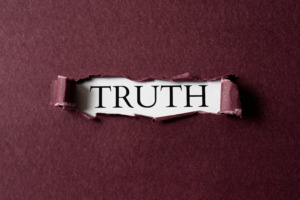Being Truthful in What I Say and Do
Warren Lehr | February 2024
Warren Lehr | February 2024
 Honesty may be the most popular of all character traits, at least in the United States.
Honesty may be the most popular of all character traits, at least in the United States.
This is likely owing to the esteemed “fathers of our country.” It was the young George Washington who was long storied to have said, “Father, I cannot tell a lie. I cut the tree.” While the truth of that story has been largely contested, the famous saying of Benjamin Franklin is rarely questioned. “Honesty is the best policy” is largely attributed to Franklin, but was very likely inspired by Sir Edwin Sandys, a member of British Parliament, who first wrote the words in 1599. These two accounts, ironically about honesty, illustrate that truthfulness can be elusive.
The fact that the truthfulness of historical accounts needs, at times, to be researched and checked, only reinforces and supports the importance of honesty, and highlights the importance of personal truthfulness. Personal honesty is at the heart of trust building and trust is the key to healthy relationships.
Being truthful in what I say and do can be as simple as being genuine in my words and actions, speaking what I know to be true and doing what I say I will do.
On one hand, it can be easier than ever to check on the truth of something…just Google it. But let’s take a closer look at personal honesty. A well-known pastor recently asked the question, “When you lie, who do you lie to the most?” Your kids? Your parents? Your boss? Your friends? On social media……?
It probably won’t surprise you to hear that research shows the person we lie to the most is ourselves! I know the person I lie to the most is me. It takes just a little humility to acknowledge this. The research and studies bear it out, but we don’t really need experts to tell us that we lie to ourselves dozens, sometimes even hundreds of times a day. We tell ourselves, “I didn’t do anything wrong…. I can stop anytime…Nobody is getting hurt…. I’ll do it tomorrow…. I don’t have the time for that…. I don’t care what people think,” or maybe, “I’m a really good person. I’ve never done that. I’m better than he is.”
Many of the lies we tell ourselves are simple self-justifying. We’re really good at that. We are all masters at rationalization to justify our actions and vindicate ourselves. And we’ve all heard a version of the saying that we judge ourselves by our intentions (or ideals), but we judge others by their behavior (or their faults). We often don’t even see our own faults, much less hold ourselves accountable for them. We rationalize our own behavior, but judge others for theirs. We’re not really being honest with ourselves.
Years ago, a coworker pointed out that we recognize flattery immediately when someone else is being flattered, but we absolutely believe it to be true when it is directed at us. And if there is no one else to flatter us, we do a pretty good job of flattering ourselves.
Psalms 36:2 (CSB) describes many of us, “For with his flattering opinion of himself, he does not discover and hate his iniquity.” Again, we often don’t even see our own faults.
So, it may be easier today to search out factual untruthfulness with Google, but it may be harder than ever to grasp personal untruthfulness within ourselves…. We’re very good at self-deception and self-justifying rationalization…. We even flatter ourselves.
So, how can we help ourselves? Honesty would dictate that we simply need to be more truthful with ourselves and others. We should always strive to speak the truth, in kindness. Someone has said, “We all need the kind truth at times.” I would say we need it now more than ever. As humans, we have a natural tendency to avoid discomfort.
More than ever, we are reluctant to “rock the boat” by speaking truth into the lives of those we are closest to; but if we don’t do it, who will? When there is a problem or disagreement in our culture today, it often spurs gossip and slander leading to resentment and division, rather than what personal honesty and the “kind truth” could bring: grace and truth leading to reconciliation and unity.
It’s a popular truism in leadership discussions today that the #1 trait undermining a person’s influence is lack of self-awareness. Let me ask though, how can we become more self-aware if there is no one who will kindly point out our blind spots? How can we come face-to-face with the kind truth about ourselves if no one will share it with us? We live in a time where comfort rules and personal honesty suffers, where grace goes without truth and thereby ceases to be grace.
And though personal honesty can be to oneself or to one other person, there are times when we are in-person-present to discrimination, harassment, slander or other unjust behaviors when we need the courage to hold up the truth to maybe just a few peers or even to a large group. This is also personal honesty. It is honesty to our own values. To be silent at such times is a violation of personal honesty.
It’s so important to share our values and be honest with our friends, family, and peers.
In turn, we have to ask them to hold us accountable, to share the kind truth with us.
We really do need the courage to ask for honesty, and the loyalty to tell the kind truth. Proverbs 28:23 (NLT) says, “In the end, people appreciate honest criticism far more than flattery.” Your friends, family, and peers will honestly appreciate your kind truth.

 Balancing Instinct and Deliberation: Mastering Decisiveness in Leadership
Balancing Instinct and Deliberation: Mastering Decisiveness in Leadership